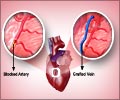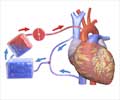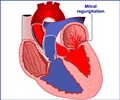Major heart surgery does not affect brain function in elderly patients, finds a new study.

‘Major heart surgery does not affect brain function in elderly patients. Average memory change after surgery is presumed to be subtle, with minimal impact on independence and daily function.
’
Read More..




Using the Health and Retirement Study (HRS), Dr Whitlock and colleagues examined data from 3,105 participants who reported undergoing either heart surgery or cardiac catheterization between 2000 and 2014. Cardiac catheterization is a catheter-based procedure that is usually performed as a diagnostic procedure prior to cardiac surgery. It is also used in conjunction with placing coronary artery stents to treat coronary artery disease. Read More..
Funded by the National Institute on Aging, the HRS is an anonymous study of older adults in the United States. Thousands of HRS participants answer questions about their health and take brief memory tests every two years. Data on demographic, economic, health, quality of life, and cognitive factors are collected.
"It is important to make sure research like this includes diverse and large samples to fully account for other characteristics associated with who receives surgery," said Dr Whitlock. "The HRS has been an incredible resource for understanding health and aging in America."
The researchers separated the patients all of whom were at least 65 years old into two groups: "catheterization" with 1,921 (62 percent) and "heart surgery" with 1,184 (38 percent). In the analysis, heart surgery was not associated with additional memory decline; researchers found that surgery participants showed little difference (-.021 memory units, equal to 4.6 months of cognitive aging) in pre- to post-procedure memory compared with those undergoing catheterization. For a 75-year-old person, this translated into a very small 0.26 percent increased risk of his/her inability to manage finances independently and a 0.19 percent increased risk of being unable to manage medications independently, said Dr Whitlock.
"We expected to find a bigger difference in the surgery group since there are many anecdotes about serious cognitive decline after heart surgery," said Dr Whitlock. "Our results are different for several reasons, one being that our follow-up is up to 2 years after surgery, to account for the fact that people may improve over time."
Advertisement
"Since patients aren't choosing between 'surgery for heart disease' and 'no heart disease,' it isn't fair to compare the memory outcomes of these two groups," said Dr Whitlock. "Our findings suggest that there isn't a major long-term impact when these two methods of correcting serious heart problems are compared. We think this is because severe heart disease itself probably has a cognitive impact."
Advertisement
While it is not known for certain what causes POCD, researchers explained that factors such as small strokes that happen during surgery, the impact of inflammation from tissue trauma, and pain medications might have a role. Disrupted sleep, delirium, infections, and physical inactivity also may contribute.
"Most of these factors are temporary, so while they may explain an initial cognitive decline seen in the weeks after major surgery, cognition should gradually improve as the contributors resolve," said Dr Whitlock. "That's why this approach looking at up to two years after surgery is a very important way to look at the 'old problem' of POCD."
Source-Eurekalert















